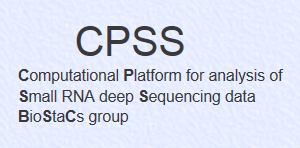Status:
Platform:
Species:
Next generation sequencing (NGS) techniques have been widely used to document the small ribonucleic acids (RNAs) implicated in a variety of biological, physiological and pathological processes. An integrated computational tool is needed for handling and analysing the enormous datasets from small RNA deep sequencing approach. Herein, we present a novel web server, CPSS (a computational platform for the analysis of small RNA deep sequencing data), designed to completely annotate and functionally analyse microRNAs (miRNAs) from NGS data on one platform with a single data submission. Small RNA NGS data can be submitted to this server with analysis results being returned in two parts: (i) annotation analysis, which provides the most comprehensive analysis for small RNA transcriptome, including length distribution and genome mapping of sequencing reads, small RNA quantification, prediction of novel miRNAs, identification of differentially expressed miRNAs, piwi-interacting RNAs and other non-coding small RNAs between paired samples and detection of miRNA editing and modifications and (ii) functional analysis, including prediction of miRNA targeted genes by multiple tools, enrichment of gene ontology terms, signalling pathway involvement and protein-protein interaction analysis for the predicted genes. CPSS, a ready-to-use web server that integrates most functions of currently available bioinformatics tools, provides all the information wanted by the majority of users from small RNA deep sequencing datasets.
CPSS is implemented in PHP/PERL+MySQL+R and can be freely accessed at http://mcg.ustc.edu.cn/db/cpss/index.html or http://mcg.ustc.edu.cn/sdap1/cpss/index.html.[1]
Next-generation sequencing has been widely applied to understand the complexity of non-coding RNAs (ncRNAs) in the last decades. Here, we present CPSS 2.0, an updated version of CPSS 1.0 for small RNA sequencing data analysis, with the following improvements: 1) a substantial increase of supported species from 10 to 48; 2) improved strategies applied to detect ncRNAs; 3) more ncRNAs can be detected and profiled, such as lncRNA and circRNA; 4) identification of differentially expressed ncRNAs among multiple samples; 5) enhanced visualization interface containing graphs and charts in detailed analysis results. The new version of CPSS is an efficient bioinformatics tool for users in non-coding RNA research.
CPSS 2.0 is implemented in PHP + Perl + R and can be freely accessed at http://114.214.166.79/cpss2.0/ .
zyuanwei@ustc.edu.cn.
Supplementary data are available at Bioinformatics online.[2]








